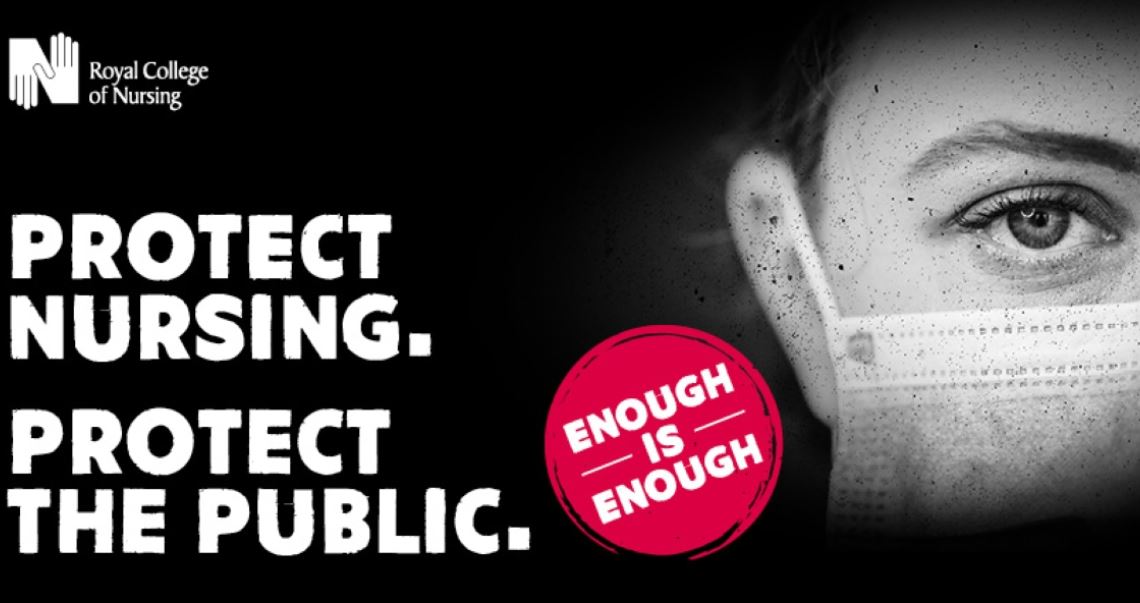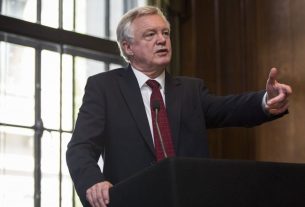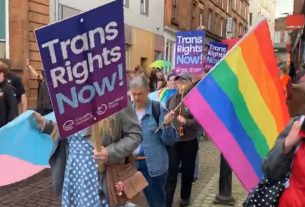Nurses have voted for the biggest strike in NHS history after a decade of paycuts that has seen their pay fall 20% since 2010.
The first ever national strike by members of the Royal College of Nursing (RCN) will be held before Christmas, the Observer reports.
While disruption to services is inevitable, the government said it has “well-oiled contingencies” for scenarios such as a nurses strike.
However, the NHS is already backlogged and recording record waiting lists and severe staff shortages.
Nurses strike after 20% pay cut since 2010
In the 12 years since the Conservatives took power, the pay of experienced nurses has fallen 20% in real terms, unions say. They are calling for a new pay increase of 5% on top of inflation – effectively around a 15% rise.
The government has given a 4% rise taking nurses’ average basic pay to around £37,000.
Cabinet minister Oliver Dowden has called on nurses to rethink their strike action, and claimed: “We have already agreed quite considerable support for nurses.”
A spokesperson for the Royal College of Nurses (RCN) said: “Cutting nurses’ wages by 20% since 2010 is the opposite of providing ‘considerable support’ for nurses and the Cabinet Office Minister shouldn’t insult our members by pretending it is.
“The minister appears in denial about both the anger of nursing staff and the public support we have.”
A YouGov poll earlier this year placed nurses at the top of professions that make the biggest contribution to society, the Independent reports, reminding of the “significant sacrifices” nurses made during the Covid pandemic.
The RCN recommended strike action to its 300,000 members for the first time in its history and will publish the ballot results this week. The Guardian reports that other health workers – including ambulance staff and hospital porters and cleaners – have already or will soon be voting on taking industrial action.
Dowden – who was previously chair of the Conservative party – told Sky News’ Sophy Ridge on Sunday that “well-oiled contingencies” are in place should nurses strike. The Department of Health and Social Care (DHSC) is positioned to “deal with a scenario like this should it arise”, Dowden said, adding that essential services will be prioritised. However, Dowden did acknowledge “there would be an impact as a result of a [nurses] strike like that.”
Dowden told Ridge: “Of course, if you are in the situation where you have a large number of nurses going out on strike, of course that is going to have an impact for example on some elective surgery and other activities.”
The i warned a nurses strike will affect emergency care while the Telegraph reports the service will be reduced to that delivered on Bank Holidays. Patients will see chemotherapy and dialysis treatments cancelled, health bosses have warned.
A spokesperson for the DHSC said: “We value the hard work of NHS staff including nurses, and are working hard to support them – including by giving over one million NHS workers a pay rise of at least £1,400 this year as recommended by the independent NHS Pay Review Body, on top of 3% last year when pay was frozen in the wider public sector.
“Industrial action is a matter for unions, and we urge them to carefully consider the potential impacts on patients.”
Pat Cullen, the general secretary of the RCN said: “There has never been a more crucial time to fight for safe staffing and fair pay.
“Our NHS is on the precipice due to chronic staff shortages. Our profession is being pushed to the edge, with patient safety paying the price.
“None of us wants to take industrial action but we’ve been forced into this position after a decade of real-terms pay cuts. We can’t stand by and watch our colleagues and patients suffer anymore. Enough is enough.”




